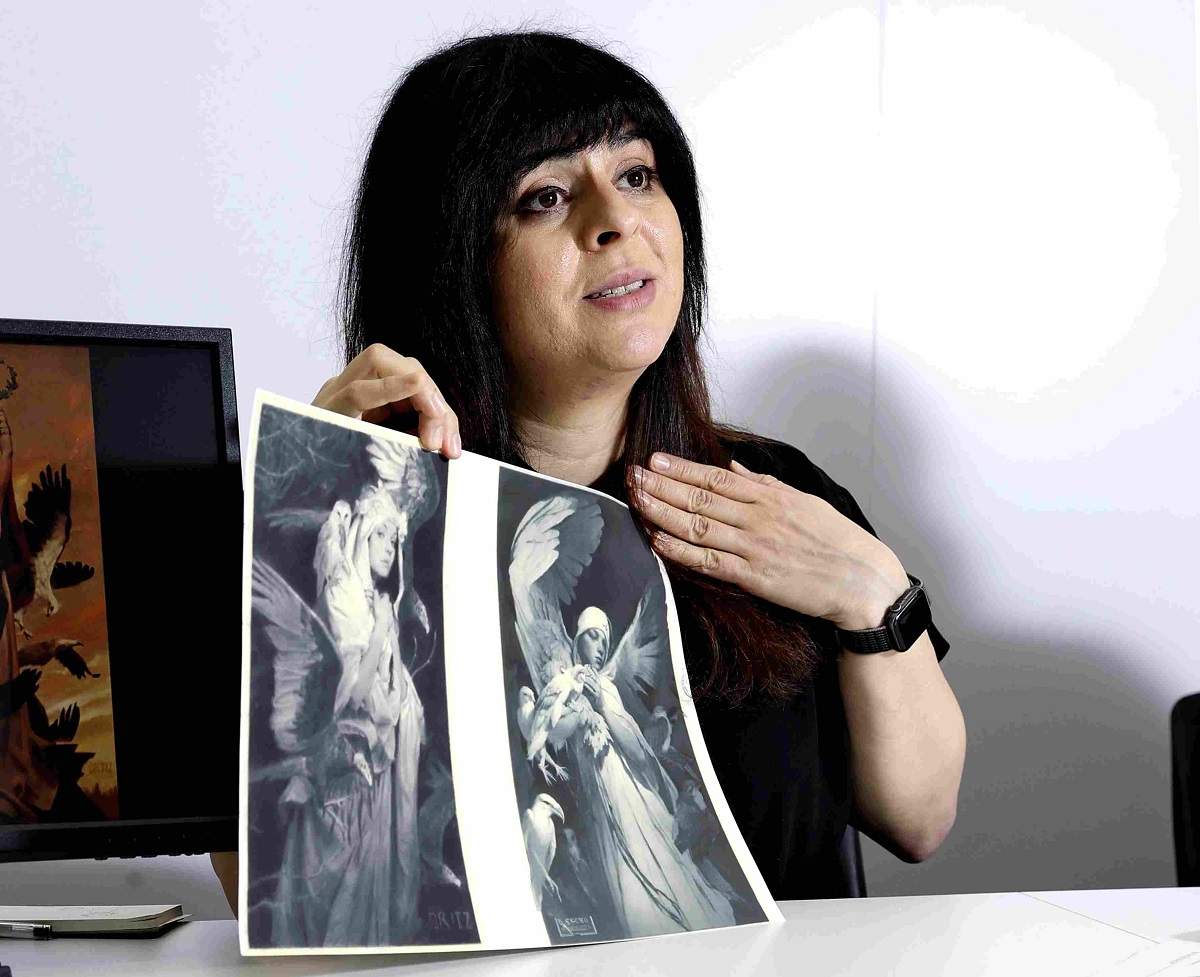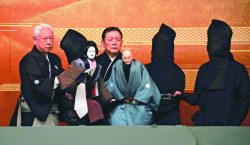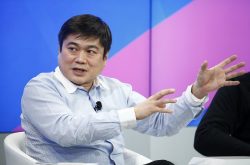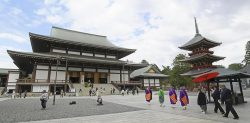Examining Generative AI / Invasion of Culture Through Unauthorized AI Learning; Copyright Protection Essential to Protect Creative Industry

U.S. artist Karla Ortiz holds her own drawing, left, and an image generated by AI in Chiyoda Ward, Tokyo, in December 2023.
The Yomiuri Shimbun
7:00 JST, February 23, 2024
This is the fifth and final installment in a series in which The Yomiuri Shimbun considers how humanity should deal with the emergence of generative AI.
***
U.S. artist Karla Ortiz held two pictures in front of her. One was her pencil drawing from 2016 titled “The Death I Bring,” while the other, similar picture had been “created” by image-generating AI based on her work.
“I hate it,” Ortiz told The Yomiuri Shimbun in December, saying the AI-generated work was “like a monster made from all the parts of my work.”
The 38-year-old artist filed a class action lawsuit with other artists in a U.S. court in January 2023, claiming their copyrights had been violated by companies that developed generative AI software. The plaintiffs alleged that billions of images, including their artwork, were used without permission to train AI, resulting in “copyright-laundering” of images that benefit the software developers.
“We want to end the unprecedented violation of legal rights, because our jobs, our profession and our creative communities are demolished by these companies,” Ortiz said.
“An image of Mt. Fuji that looks it was painted by Van Gogh,” “Dancing Mickey Mouse” — just giving directions like this to generative AI will produce images based on the learning of a vast amount of data, including copyrighted works.
Artists and writers filed a series of lawsuits in the United States in 2023 against companies that developed such systems, claiming that their copyrighted works were used without permission to train AI.
Such concerns have also been raised in Japan.
An illustrator in his 30s had been designing anime-like characters under an outsourcing contract with an internet-related company. However, starting about a year ago when generative AI began spreading in society, the company started producing AI-made illustrations of characters he created, and selling them without his permission. The company stopped offering work to the illustrator.
“They trampled on my motivation and pride in life,” said the illustrator. “If this kind of behavior goes unchecked, the market will collapse. Appropriate legislation is essential.”
Japan is said to be a “machine learning paradise” for generative AI, as Article 30-4 of the Copyright Law, introduced in 2018 legal revisions, allows AI to perform machine learning of copyrighted works without permission.
It is not allowed to do so “if the action would unreasonably prejudice the interests of the copyright owner,” but few specific cases have been brought.
Four organizations — The Japan Newspaper Publishers & Editors Association, the Japan Magazine Publishers Association, the Japan Photographic Copyright Association and the Japan Book Publishers Association — issued a joint statement in August that called for measures to be considered to protect rights, saying, “Japan’s Copyright Law is extremely favorable to AI learning compared to other countries.”
The Japan Newspaper Publishers & Editors Association is arguing for urgent revision of the Copyright Law.
In December, the Cultural Affairs Agency presented a draft of its thinking, which gave examples of cases in which unauthorized learning is not allowed. However, it did not mention amending the law.
Kobe University Prof. Masahiko Kinoshita, who specializes in constitutional and information law, said: “The Copyright Law does not envision a situation where generative AI instantly produces creative works, which may result in the insufficient return of profits to copyright holders. A new legal system should be considered.”
According to anime producer Masuro Ueda, who leads the Nippon Anime & Film Culture Association, “It’s essential for the copyright issue to be cleared up if AI is to become a ‘good partner.”
“If the efforts of creators keep being ignored, fewer people will strive to create new things, which could result in a decline in culture,” said Ueda, who has worked on popular anime such as “Mobile Suit Gundam” and “City Hunter.”
The evolution of AI is causing unprecedented, tectonic shifts in creative activities. The question now is how to protect the intellectual activities of human beings.
Most Read
Popular articles in the past 24 hours
-

Record Snowfall in Japan Causes Serious Agricultural Damage in To...
-

Japan Police Told to Boost Security, Vigilance Around U.S., Israe...
-

Japan Traditional Puppet Performance Held at Onsen Resort in Shiz...
-

U.S. Urges Citizens to Immediately Depart over A Dozen Middle Eas...
-

Strait of Hormuz Closure Shakes Markets; Prolonged Closure Could ...
-

2 of Japan's Opposition Parties Submit Bill to Revise Political F...
-

Japanese Firms Ban Business Trips, Cancel Vacation Tours Amid Mid...
-

Joichi Ito’s Japan Government Role Uncertain Amid Fresh Epstein S...
Popular articles in the past week
-

Milano Cortina 2026: Japanese Gold Medalist Figure Skater Miura S...
-

Tokyo Spends Big on Children, Wins Over Parents
-

Japan’s Miura, Kihara Announce Withdrawal from Figure Skating Wor...
-

Exhibition Featuring Yoshiharu Tsuge’s Manga World Underway in Ch...
-

Yokohama to Test Out Renewable-Powered Offshore Floating Data Cen...
-

BOJ Keeping Eye on Economy and Takaichi's ‘Proactive Fiscal Polic...
-

Tokyo Measles Patient Traveled to Fukuoka Aboard JAL Planes; Susp...
-

Japan Seeks to Counter China's Expanding Influence in Pacific by ...
Popular articles in the past month
-

Producer Behind Pop Group XG Arrested for Cocaine Possession
-

Japan PM Takaichi’s Cabinet Resigns en Masse
-

Man Infected with Measles Reportedly Dined at Restaurant in Tokyo...
-

Israeli Ambassador to Japan Speaks about Japan’s Role in the Reco...
-

Videos Plagiarized, Reposted with False Subtitles Claiming ‘Ryuky...
-

Man Infected with Measles May Have Come in Contact with Many Peop...
-

Prudential Life Insurance Plans to Fully Compensate for Damages C...
-

Woman with Measles Visited Hospital in Tokyo Multiple Times Befor...
Top Articles in Society
-

Producer Behind Pop Group XG Arrested for Cocaine Possession
-

Man Infected with Measles Reportedly Dined at Restaurant in Tokyo Station
-

Man Infected with Measles May Have Come in Contact with Many People in Tokyo, Went to Store, Restaurant Around When Symptoms Emerged
-

Woman with Measles Visited Hospital in Tokyo Multiple Times Before Being Diagnosed with Disease
-

Bus Carrying 40 Passengers Catches Fire on Chuo Expressway; All Evacuate Safely
JN ACCESS RANKING
-

Producer Behind Pop Group XG Arrested for Cocaine Possession
-

Japan PM Takaichi’s Cabinet Resigns en Masse
-

Man Infected with Measles Reportedly Dined at Restaurant in Tokyo Station
-

Israeli Ambassador to Japan Speaks about Japan’s Role in the Reconstruction of Gaza
-

Videos Plagiarized, Reposted with False Subtitles Claiming ‘Ryukyu Belongs to China’; Anti-China False Information Also Posted in Japan








